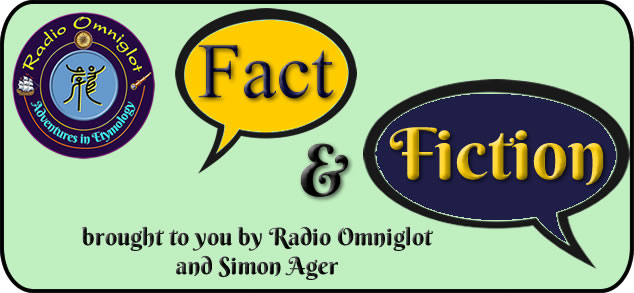Podcast: Play in new window | Download

Here’s the latest news from the world of Omniglot.
New language pages:
- Ha (Igiha), a Bantu language spoken in the Kigoma Region in the northwest of Tanzania.
- Fut (Bɨfɨɨ̀), an Eastern Grassfields language spoken in the Northwest Region of Cameroon.
- Maasina Fulfulde (مَاسِنَ ڢُلْڢُلْدٜ), a West Central Fula language spoken in Mali, Ivory Coast and Ghana.
- Tadaksahak (Tadáksahak), a Northern Songhay language spoken in southern Mali and western Niger.
New numbers pages:
- Fut (Bɨfɨɨ̀), an Eastern Grassfields language spoken in the Northwest Region of Cameroon.
- Bambalang (Chrambo), an Eastern Grassfields language spoken in Cameroon.
- Tadaksahak (Tadáksahak), a Northern Songhay language spoken in southern Mali and western Niger.
New constructed script: Sleep Token Alphabet, a cypher for English that appears on album artwork and merch for the band Sleep Token.

This week on the Omniglot blog we find out whether the words (ham)burger, burgher and burglar are related in a post called Burgling Burg(h)ers, and there’s the usual Language Quiz. See if you can guess what language this is:
Here’s a clue: this language is spoken in French Polynesia.
The mystery language in last week’s language quiz was Makaa (mǝ́kaá), a Bantu language spoken in the East Region of Cameroon.
In this week’s Adventure in Etymology we investigate the origins of the word Nemesis.
It’s also available on Instagram and TikTok.
On the Celtiadur blog there’s a new post entitled Sighing Groans about words for sigh, groan and related things in Celtic languages.
In other news, I started using the Ling App [affiliate link] to learn some more Cantonese this week. I’ve studied Cantonese before, and have forgotten a lot, but it’s now coming back to me. Ling is similar to Duolingo in the style of lessons, and offers courses in 60+ languages. You can get a free trial on the 1-year subscription, after which you have to pay. I may review it when I’ve spent more time on it, but so far I’m finding it useful and well-put together.
For more Omniglot News, see:
https://www.omniglot.com/news/
https://www.facebook.com/groups/omniglot/
https://www.facebook.com/Omniglot-100430558332117
You can also listen to this podcast on: Apple Podcasts, Amazon Music, TuneIn and Podchaser.
If you would like to support this podcast, you can make a donation via PayPal or Patreon, or contribute to Omniglot in other ways.
Radio Omniglot podcasts are brought to you in association with Blubrry Podcast Hosting, a great place to host your podcasts. Get your first month free with the promo code omniglot.














